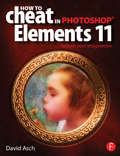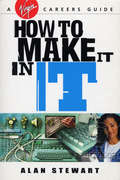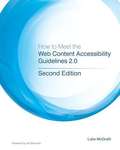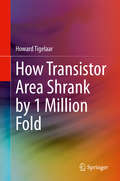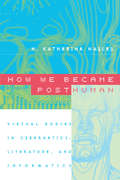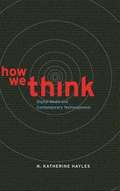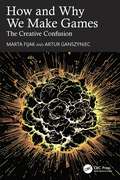- Table View
- List View
How To Cheat in Photoshop Elements 11: Release Your Imagination
by David AschHave you ever wanted to summon magical powers? Create a stained glass style masterpiece? Or turn Summer into Fall? There’s a whole world of opportunity out there for creating fun photomontages, powerful panoramas, and dynamic distortions. Redesigned and completely rewritten for Elements 11, this book starts you at the basics of photomontage with selection techniques, layers and transformations; leading up to full-length projects for creating magazine covers, fantasy scenes, poster artwork and much, much more. This book also features a dedicated website where you can download images and tutorial videos that show you how to expand, develop, and master top techniques. As well as, full color images, a glossary of terms, useful keyboard shortcuts, and a detailed index that will help you locate that fantastic technique in a flash.
How To Cheat in Photoshop Elements 12: Release Your Imagination
by David AschHave you ever wanted to summon magical powers? Appear in a graphic novel? Or control the weather and seasons? There’s a whole world of opportunity out there for creating fun photomontages, powerful panoramas, and dynamic distortions. <P><P> How to Cheat in Photoshop Elements 12 starts you at the basics of photomontage with selection techniques, layers and transformations; leading up to full-length projects for creating magazine covers, fantasy scenes, poster artwork and much, much more. <P><P> This book also features: A dedicated website where you can download images and tutorial videos that show you how to expand, develop, and master top techniques. Full color images, a glossary of terms, useful keyboard shortcuts, and a detailed index that will help you locate that fantastic technique in a flash.
How To Crush Social Media In Only 2 Minutes A Day: Twitter, Facebook, Instagram, Kred, Goodreads, Linkedin
by Ndeye Labadens James Goonwrite. ComPrepare to Crush the Game of Social Media! This is a fun and powerful method to promote your business, book, or item. Why Do You Need to Crush Social Network? This book offers step- by- step instructions to build your social media presence with your platforms and /or blog. You'll have access to multiple resources to help increase your sales and your online presence. For example, do you know the best keywords to use? When is the most beneficial time to use Twitter? How do you change listings on Goodreads? You'll find answers to these questions and many more. Prepare to Crush the Social Media in Only 2 Minutes a Day is a must-have!
How To Diagnose And Fix Everything Electronic
by Michael Jay GeierRepair all kinds of electrical products, from modern digital gadgets to analog antiques, with help from this updated book. How to Diagnose and Fix Everything Electronic, Second Edition, offers expert insights, case studies, and step-by-step instruction from a lifelong electronics guru. Discover how to assemble your workbench, use the latest test equipment, zero in on and replace dead components, and handle reassembly. Instructions for specific devices, including stereos, MP3 players, digital cameras, flat-panel TVs, laptops, headsets, and mobile devices are also included in this do-it-yourself guide. Choose the proper tools and set up your workbench Ensure personal safety and use proper eye and ear protection Understand how electrical components work and why they fail Perform preliminary diagnoses based on symptoms Use test equipment, including digital multimeters, ESR meters, frequency counters, and oscilloscopes Interpret block, schematic, and pictorial diagrams Disassemble products and identify sections Analyze circuits, locate faults, and replace dead parts Re-establish connections and reassemble devices
How To Disappear: Erase Your Digital Footprint, Leave False Trails, And Vanish Without A Trace (Globe Pequot Ser.)
by Eileen Horan Frank AhearnHow to Disappear is the authoritative and comprehensive guide for people who seek to protect their privacy as well as for anyone who’s ever entertained the fantasy of disappearing—whether actually dropping out of sight or by eliminating the traceable evidence of their existence. <p><p> Written by the world’s leading experts on finding people and helping people avoid being found, How to Disappear covers everything from tools for disappearing to discovering and eliminating the nearly invisible tracks and clues we tend to leave wherever we go. Learn the three keys to disappearing, all about your electronic footprints, the dangers and opportunities of social networking sites, and how to disappear from a stalker. <p> Frank Ahearn and Eileen Horan provide field-tested methods for maintaining privacy, as well as tactics and strategies for protecting personal information and preventing identity theft. They explain and illustrate key tactics such as misinformation (destroying all the data known about you); disinformation (creating fake trails); and, finally, reformation—the act of getting you from point A to point B without leaving clues. <p> Ahearn illustrates every step with real-life stories of his fascinating career, from undercover work to nab thieving department store employees to a stint as a private investigator; and, later, as a career “skip tracer” who finds people who don’t want to be found. In 1997, when news broke of President Bill Clinton’s dalliance with a White House intern, Ahearn was hired to find her. When Oscar statuettes were stolen in Beverly Hills, Ahearn pinpointed a principal in the caper to help solve the case. When Russell Crowe threw a telephone at a hotel clerk in 2005, Ahearn located the victim and hid him from the media. <p> An indispensable resource not just for those determined to become utterly anonymous, but also for just about anyone in the brave new world of on-line information, How to Disappear sums up Ahearn’s dual philosophy: Don’t break the law, but know how to protect yourself.
How To Get Back Links: 10 Extremely Powerful Backlinks Sources To Building Website Backlinks And Exploding Your Traffic
by Brian GravesOver 60 website examples where you can find these 10 different back linking types, ranging from PR4-PR9.You also get strategies for each link type that you can use to increase website traffic.
How To Grow Your Business On The Internet
by Vincent EmeryFor the computer challenged potential entrepreneur, extols the benefits of opening shop on Cyberstreet, explains the requirements and protocols, outlines business strategies, warns against accidents and attacks, and suggests 11 businesses that might work. Further information is available free on the World Wide Web. A list of free business resources on the Internet stands in for a bibliography. Annotation c. by Book News, Inc. , Portland, Or.
How To Hack Like A God: Master The Secrets Of Hacking Through Real Life Scenarios (Hack The Planet Ser.)
by Sparc FlowFollow me on a step-by-step hacking journey where we pwn a high-profile fashion company. From zero initial access to remotely recording board meetings, we will detail every custom script and technique used in this attack, drawn from real-life findings, to paint the most realistic picture possible. Whether you are a wannabe pentester dreaming about real-life hacking experiences or an experienced ethical hacker tired of countless Metasploit tutorials, you will find unique gems in this book for you to try: -Playing with Kerberos -Bypassing Citrix & Applocker -Mainframe hacking -Fileless WMI persistence -NoSQL injections -Wiegand protocol -Exfiltration techniques -Antivirus evasion tricks -And much more advanced hacking techniques I have documented almost every tool and custom script used in this book. I strongly encourage you to test them out yourself and master their capabilities (and limitations) in an environment you own and control. Hack (safely) the Planet! (Previously published as How to Hack a Fashion Brand)
How To Increase Your Website Traffic
by Khoa BuiTHE SECRETS CONTAINED IN THIS BOOK HAVE LITERALLY MADE ME THOUSANDS OF DOLLARS ONLINE AND I HOPE IT CAN DO THE SAME FOR YOU TOO!THIS BOOK WILL HELP YOU...Climb higher in the Search EnginesAttract More Website Visitors by 500%Massively Increase Your SalesExpose Yourself to Greater Opportunities OnlineOvertake Competitor WebsitesMake More Money OnlineSell More Products and ServicesLearn How to Convert Your Traffic to SalesALSO COVERS...Social NetworkingLow Cost Traffic Generation StrategiesThe Khoa Bui Cash Website Triangle FormulaDomain Name TipsHow to Optimize Your Website for SpeedHow to Harness Publicity OnlineWhe the Colors on Your Website May Not Be EffectivePLUS ACCESS FREE AUDIO BOOK ($197 VALUE)!I'm a big fan of simplicity for success, and Khoa's new book lays out an easy-to-follow plan to increase your website traffic and convert those visitors to cash.-Ali Brown, CEO & Founder of Ali InternationalEvery single day, millions of people go online but don't visit your site. Khoa Bui wants to change that-and he can with his remarkable book. So he did his part. Now it's time for you to do yours. I predict success if you do.-Jay Conrad Levinson, Father of Guerrilla Marketing, Author of Guerrilla Marketing seriesHow to Increase Your Website Traffic is a content-rich book, packed with powerful ideas that will help Internet entrepreneurs increase their sales and business profits.-Adam Khoo, Asia's #1 Success Coach, Author of Secrets of Self-Made Millionaires
How To Make $100,000 Thanks To Youtube: Learn How You Can Get Free Targeted Traffic From Videos
by Gabriel BothIn this book “How To Make $100,000 Per Year Thanks To YouTube”, you’ll learn everything you need to start making money online with your videos and harnessing the vast potential of this platform. Nine different video marketing & YouTube experts including the author, Gabriel Both, share their expert tips, secret strategies and insider tactics that have been proven to get higher search rankings, more views, and more sales. Imagine yourself waking up in the morning, looking at your inbox and seeing that you’ve made money while you were sleeping, all thanks to YouTube. How would that make you feel? Pretty amazing, right?! Even if you’ve already tried to succeed on YouTube in the past but failed, this book will give you a renewed sense of hope along with practical advice that you can start applying today to get the results you desire.
How To Make A Fortune On The Internet: A Guide For Anyone Who Wants To Create A Massive - And Passive - Income For Life
by Ajay AhujaIf you can point and click a mouse, type on a keyboard and have a basic grasp of the English language then you can make a fortune on the internet if you know what to do. This book will show you exactly what to do. You will learn how to: * Build a website and go live in 1 hour * Accept online payments and set up statements to track your income * Drive traffic to your site by getting your site listed instantly with the major search engines like Yahoo and Google. * Earn up to GBP10 per click every time someone clicks on your site * Earn up to GBP115 every time someone fills out a form on your site * Get other web publishers to sell your stuff *Create a database of readers you can profit from every time you update your site * Have a chat room, forum and video forum on your website for free * Automatically send out an email everyday with no input from you * Incorporate a search box on your site that makes you money every time someone searches * Add ready-made articles about your chosen subject to your site completely free - simply copy and paste!
How To Make It In IT
by Alan StewartComputers have been in daily use at work for nearly half a century. Each new generation of the technology – mainframes, mini-computers, Cs and the Internet – has brought a demand for a fresh set of skills, but there are never enough people to fill the ever-growing number of posts in the IT sector. This guarantees that there is stiff competition among employers for the best technicians, which means that salaries can be very high.The overall picture might be rosy, but if you want an honest evaluation of the different areas and jobs on offer, you need this book. Have you got the intellectual stamina to be a security analyst? What qualities and skills are employers looking for in their technical authors and operations managers? And how can you freelance successfully as a programmer or consultant? Based on interviews with people at all levels of the industry, this informed, no-nonsense guide points you to the right job – and shows you how to get it.Whether you want to be the next Bill Gates or would be quite happy in a secure job with a blue-chip company, your IT career starts here.
How To Make Money Organizing Information
by Anne HartHow to make money organizing information offers 29 businesses to open at home and/or online at very low cost for people who write, produce, package, research, retrieve, or organize any type of information for a variety of markets. Many of the writing and/or information related businesses or careers are especially suited to disabled people. For example, working with computer Braille or working with information for audio learning. Also helpful are careers re-packaging and organizing information for various professions and other specialty areas. Some businesses consist of using software to organize people on lists as for matching services for real estate, travel, and other services. A variety of careers for writers are discussed that will appeal to writers with disabilities as well as people who index books, for example with disabilities such as using software for the blind and editing using audio software for the visually impaired editor, writer, proofreader, or producer of learning materials and multimedia. For example, software allows blind Web designers and programmers to work with design. How to make money organizing information explains many careers--29 businesses, and writing techniques.
How To Make Your Dog #Famous: A Guide to Social Media and Beyond
by Loni EdwardsYou know your dog is the cutest but does everyone else know it too?In this book, Loni Edwards, the human behind the world's most influential pets, breaks down the path to fame. Discover insights into the success of social media's top pups and follow the essential steps on the road to fame - from crafting your brand to advocating for your pup on set. With expert guidance on how to be a good dog parent and make sure your pup is happy and healthy every step of the way, this is your one-stop guide to helping your dog win over hearts, one adorable post at a time.Featuring the stories of more than 40 of the most successful pet influencers:157 of Gemma, Amazing Graciedoodle, Barkley Sir Charles, Bertie Bert the Pom, Bronson the Bully, Brussels Sprout, Bully Baloo, Charlie the Black Shepherd, Chloe the Mini Frenchie (& Emma Bear), Coco the Maltese Dog (Coco & Cici), Cookie Malibu, Crusoe the Celebrity Dachshund, Daily Dougie, Dog named Stella, Ducky the Yorkie, Frame the Weim, Gone to the Snow Dogs, Harlow and Sage, Hi Wiley, Kelly Bove, Lilybug, Lizzie Bear, Louboutina the Hugging Dog, Maya Polar Bear, Mervin the Chihuahua, Milo and Noah, MJ the Beagle, Mr. Biggie, Popeye the Foodie, Puggy Smalls, Reagandoodle, Remix the Dog, Rocco Roni, Super Corgi Jojo, Super Scooty, Tatum, That Goldendoodle, The Bike Dog, Tika the Iggy, Tuna Melts my Heart, Tupey the Borzoi, Verpinscht, Winnie the Cocker, Wolfgang 2242
How To Make Your Dog #Famous: A Guide to Social Media and Beyond
by Loni EdwardsYou know your dog is the cutest but does everyone else know it too?In this book, Loni Edwards, the human behind the world's most influential pets, breaks down the path to fame. Discover insights into the success of social media's top pups and follow the essential steps on the road to fame - from crafting your brand to advocating for your pup on set. With expert guidance on how to be a good dog parent and make sure your pup is happy and healthy every step of the way, this is your one-stop guide to helping your dog win over hearts, one adorable post at a time.Featuring the stories of more than 40 of the most successful pet influencers:157 of Gemma, Amazing Graciedoodle, Barkley Sir Charles, Bertie Bert the Pom, Bronson the Bully, Brussels Sprout, Bully Baloo, Charlie the Black Shepherd, Chloe the Mini Frenchie (& Emma Bear), Coco the Maltese Dog (Coco & Cici), Cookie Malibu, Crusoe the Celebrity Dachshund, Daily Dougie, Dog named Stella, Ducky the Yorkie, Frame the Weim, Gone to the Snow Dogs, Harlow and Sage, Hi Wiley, Kelly Bove, Lilybug, Lizzie Bear, Louboutina the Hugging Dog, Maya Polar Bear, Mervin the Chihuahua, Milo and Noah, MJ the Beagle, Mr. Biggie, Popeye the Foodie, Puggy Smalls, Reagandoodle, Remix the Dog, Rocco Roni, Super Corgi Jojo, Super Scooty, Tatum, That Goldendoodle, The Bike Dog, Tika the Iggy, Tuna Melts my Heart, Tupey the Borzoi, Verpinscht, Winnie the Cocker, Wolfgang 2242
How To Meet The Web Content Accessibility Guidelines 2. 0
by Luke McGrathLearn 'How to Meet the Web Content Accessibility Guidelines 2.0′ I wrote this book to help you learn how to meet these important guidelines. You'll find out how an accessible website can still be beautiful, successful and fun for your users. Taking each guideline in turn, you'll learn why it's important for users, the best way to comply, plus any tips and tricks to make your life easier. Web accessibility is an in-demand and growing skill for developers, and this book is designed to get you started, fast. "Of all the books and documents that discuss why and how to make websites more accessible, this is the one I use and recommend more than any other." - Martin Ansdell-Smith
How To Publish An Ebook Without Going Nuts... And So Somebody Reads It
by Alejandro Aguayo Charlotte CoombeSecond expanded edition of this simple step-by-step guide to publishing an eBook without dying in the attempt and how to avoid the typical beginner's mistakes. Full of tips, resources, software recommendations and above all the experience and advice of many "indie" authors currently enjoying eBook success, such as Blanca Miosi, Bruno Nievas, Enrique Laso, Gabri Ródenas, Lidia Herbada, Blas Ruiz Grau, Roberto Lopez-Herrero, Largo Javariega and others.
How Transistor Area Shrank by 1 Million Fold
by Howard TigelaarThis book explains in layman’s terms how CMOS transistors work. The author explains step-by-step how CMOS transistors are built, along with an explanation of the purpose of each process step. He describes for readers the key inventions and developments in science and engineering that overcame huge obstacles, enabling engineers to shrink transistor area by over 1 million fold and build billions of transistor switches that switch over a billion times a second, all on a piece of silicon smaller than a thumbnail.
How We Became Posthuman: Virtual Bodies in Cybernetics, Literature, and Informatics
by N. Katherine HaylesHayles (English, UCLA) investigates the fate of embodiment in an information age. Ranging widely across the history of technology and culture, she relates three interwoven stories: how information came to be conceptualized as an entity separate from material forms; the cultural and technological construction of the cyborg; and the dismantling of the liberal humanist subject in cybernetic discourse. From the birth of cybernetics to artificial life, she provides an account of how we arrived in our virtual age.
How We Test Software at Microsoft®
by Alan Page Ken Johnston B. J. RollisonPage, director of test excellence for Microsoft, joins two other Microsoft test professionals to share best practices used by the company's 9,000-strong corps of testers. The book begins by familiarizing readers with Microsoft's products, engineers, and testers, and describing general approaches to engineering software. The second and third parts of the book discuss many of the test approaches and tools commonly used at Microsoft. The final section discusses future directions in testing and quality at Microsoft. The book is for general readers and students and professionals in the industry. Annotation ©2009 Book News, Inc. , Portland, OR (booknews. com)
How We Test Software at Microsoft®
by Alan Page Bj Rollison Ken JohnstonIt may surprise you to learn that Microsoft employs as many software testers as developers. Less surprising is the emphasis the company places on the testing discipline--and its role in managing quality across a diverse, 150+ product portfolio. This book--written by three of Microsoft's most prominent test professionals--shares the best practices, tools, and systems used by the company's 9,000-strong corps of testers. Learn how your colleagues at Microsoft design and manage testing, their approach to training and career development, and what challenges they see ahead. Most important, you'll get practical insights you can apply for better results in your organization. Discover how to: Design effective tests and run them throughout the product lifecycle Minimize cost and risk with functional tests, and know when to apply structural techniques Measure code complexity to identify bugs and potential maintenance issues Use models to generate test cases, surface unexpected application behavior, and manage risk Know when to employ automated tests, design them for long-term use, and plug into an automation infrastructure Review the hallmarks of great testers--and the tools they use to run tests, probe systems, and track progress efficiently Explore the challenges of testing services vs. shrink-wrapped software
How We Think: Digital Media and Contemporary Technogenesis
by N. Katherine Hayles"How do we think?" N. Katherine Hayles poses this question at the beginning of this bracing exploration of the idea that we think through, with, and alongside media. As the age of print passes and new technologies appear every day, this proposition has become far more complicated, particularly for the traditionally print-based disciplines in the humanities and qualitative social sciences. With a rift growing between digital scholarship and its print-based counterpart, Hayles argues for contemporary technogenesis--the belief that humans and technics are coevolving--and advocates for what she calls comparative media studies, a new approach to locating digital work within print traditions and vice versa. Hayles examines the evolution of the field from the traditional humanities and how the digital humanities are changing academic scholarship, research, teaching, and publication. She goes on to depict the neurological consequences of working in digital media, where skimming and scanning, or "hyper reading," and analysis through machine algorithms are forms of reading as valid as close reading once was. Hayles contends that we must recognize all three types of reading and understand the limitations and possibilities of each. In addition to illustrating what a comparative media perspective entails, Hayles explores the technogenesis spiral in its full complexity. She considers the effects of early databases such as telegraph code books and confronts our changing perceptions of time and space in the digital age, illustrating this through three innovative digital productions--Steve Tomasula's electronic novel, TOC; Steven Hall's The Raw Shark Texts; and Mark Z. Danielewski's Only Revolutions. Deepening our understanding of the extraordinary transformative powers digital technologies have placed in the hands of humanists, How We Think presents a cogent rationale for tackling the challenges facing the humanities today.
How Well Do Executives Trust Their Intuition (Data Analytics Applications)
by Yolande Chan Fabio Babiloni Joanna Paliszkiewicz Jay Liebowitz Tracy Jenkin Dylan SpickerIn this age of Big Data and analytics, knowledge gained through experiential learning and intuition may be taking a back seat to analytics. However, the use of intuition should not be underestimated and should play an important role in the decision process. <P><P>How Well Do Executives Trust Their Intuition covers the Fulbright research study conducted by this international team of editors. The main question of their investigation is: How well do executives trust their intuition? In other words, do they typically prefer intuition over analysis and analytics. And equally importantly, what types of intuition may be most favorable looking at different variables? The research utilizes survey and biometrics approaches with C-level executives from Canada, U.S., Poland, and Italy. <P><P>In addition, the book contains chapters from leading executives in industry, academia, and government. Their insights provide examples of how their intuition enabled key decisions that they made. <P><P>This book covers such topics as: <li>Using intuition <li>How gender, experience, role, industry, and country affect intuition <li>Trust and intuition in management <li>Trusting intuition <li>It’s a matter of heart <li>Leadership intuition and the future of work <li>Creating an intuitive awareness for executives <li>Improvisation and instinct. <P><P>The book explores how executives can use intuition to guide decision making. It also explains how to trust intuition-based decisions. How Well Do Executives Trust Their Intuition is a timely and prescient reminder in this age of data-driven analytics that human insight, instinct, and intuition should also play key roles.
How and Why We Make Games: The Creative Confusion
by Marta Fijak Artur GanszyniecThis book delves into the intricate realms of games and their creation, examining them through cultural, systemic, and, most notably, human lenses. It explores diverse themes such as authorship, creative responsibility, the tension between games as a product and games as a form of cultural expression, and the myth of a universal audience.The book analyzes why we should put politics in our games and how hyperrealism may be a trap. It also proposes a new framework for thinking about game narrative and a different paradigm for the production altogether. Topics tackled are approached from a multidisciplinary perspective, so be prepared to read both about Peter Paul Rubens and John Carmack. There are also graphs, system rhetorics discussions, and the market reality—stakeholders, return on investments, and the gaming bubble bursting.This book is written for readers passionate about the craft of making games, including journalists and industry professionals. It offers a more humanistic perspective on games, presented by experienced writers who know the intricacies of game development.
How the Internet Became Commercial
by Shane GreensteinIn less than a decade, the Internet went from being a series of loosely connected networks used by universities and the military to the powerful commercial engine it is today. This book describes how many of the key innovations that made this possible came from entrepreneurs and iconoclasts who were outside the mainstream--and how the commercialization of the Internet was by no means a foregone conclusion at its outset.Shane Greenstein traces the evolution of the Internet from government ownership to privatization to the commercial Internet we know today. This is a story of innovation from the edges. Greenstein shows how mainstream service providers that had traditionally been leaders in the old-market economy became threatened by innovations from industry outsiders who saw economic opportunities where others didn't--and how these mainstream firms had no choice but to innovate themselves. New models were tried: some succeeded, some failed. Commercial markets turned innovations into valuable products and services as the Internet evolved in those markets. New business processes had to be created from scratch as a network originally intended for research and military defense had to deal with network interconnectivity, the needs of commercial users, and a host of challenges with implementing innovative new services.How the Internet Became Commercial demonstrates how, without any central authority, a unique and vibrant interplay between government and private industry transformed the Internet.
